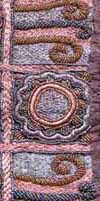18. THE MAGIC SPELL OF A BOOK
The black plague enhanced
my influence with the poor Indians, and increased my business and my responsibility.
Some of the new contacts with Europeans became so close that they added
considerably to my moral obligations.
I made the acquaintance
of Mr. Polak in the vegetarian restaurant, just as I had made that of Mr.
West. One evening a young man dining at a table a little way off sent me
his card expressing a desire to see me. I invited him to come to my table,
which he did.
'I am sub-editor of The Critic,'
he said. 'When I read your letter to the press about the plague, I felt
a strong desire to see you. I am glad to have this opportunity.'
Mr. Polak's candour drew me
to him. The same evening we got to know each other. We seemed to hold closely
similar views on the essential things of life. He liked [a] simple life.
He had a wonderful faculty of translating into practice anything that appealed
to his intellect. Some of the changes that he had made in his life were
as prompt as they were radical.
Indian Opinion was getting
more and more expensive every day. The very first report from Mr. West
was alarming. He wrote: 'I do not expect the concern to yield the profit
that you had thought probable. I am afraid there may be even a loss. The
books are not in order. There are heavy arrears to be recovered, but one
cannot make head or tail of them. Considerable overhauling will have to
be done. But all this need not alarm you. I shall try to put things right
as best I can. I remain on, whether there is profit or not.'
Mr. West might have left when
he discovered that there was no profit, and I could not have blamed him.
In fact, he had a right to arraign me for having described the concern
as profitable without proper proof. But he never so much as uttered one
word of complaint. I have, however, an impression that this discovery led
Mr. West to regard me as credulous. I had simply accepted Sjt. Madanjit's
estimate without caring to examine it, and told Mr. West to expect a profit.
I now realize that a public
worker should not make statements of which he has not made sure. Above
all, a votary of truth must exercise the greatest caution. To allow a man
to believe a thing which one has not fully verified, is to compromise truth.
I am pained to have to confess that in spite of this knowledge, I have
not quite conquered my credulous habit, for which my ambition to do more
work than I can manage is responsible. This ambition has often been a source
of worry more to my co-workers than to myself.
On receipt of Mr. West's letter,
I left for Natal. I had taken Mr. Polak into my fullest confidence. He
came to see me off at the station, and left me with a book to read during
the journey which he said I was sure to like. It was Ruskin's Unto This
Last.
The book was impossible to lay
aside, once I had begun it. It gripped me. Johannesburg to Durban was a
twenty-four hours' journey. The train reached there in the evening. I could
not get any sleep that night. I determined to change my life in accordance
with the ideals of the book.
This was the first book of Ruskin
I had ever read. During the days of my education I had read practically
nothing outside text-books, and after I launched into active life I had
very little time for reading. I cannot therefore claim much book knowledge.
However, I believe I have not lost much because of this enforced restraint.
On the contrary, the limited reading may be said to have enabled me thoroughly
to digest what I did read. Of these books, the one that brought about an
instantaneous and practical transformation in my life was Unto This
Last. I translated it later into Gujarati, entitling it Sarvodaya
(the welfare of all).
I believe that I discovered
some of my deepest convictions reflected in this great book of Ruskin,
and that is why it so captured me and made me transform my life. A poet
is one who can call forth the good latent in the human breast. Poets do
not influence all alike, for everyone is not evolved in an equal measure.
The teachings of Unto This
Last I understood to be:
1. That the good of the individual
is contained in the good of all.
2. That a lawyer's work has
the same value as the barber's, inasmuch as all have the same right of
earning their livelihood from their work.
3. That a life of labour, i.e.,
the life of the tiller of the soil and the handicraftsman, is the life
worth living.
The first of these I knew. The
second I had dimly realized. The third had never occured to me. Unto
This Last made it as clear as daylight for me that the second and the
third were contained in the first. I arose with the dawn, ready to reduce
these principles to practice.

